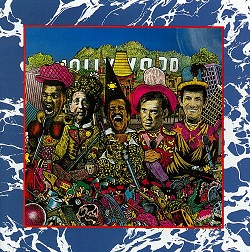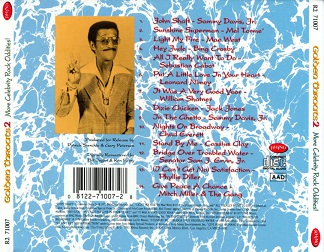The Atrocious Music Collection: #19 in a series
Artists: Various
Album Title: Golden Throats 2: More Celebrity Rock Oddities
Category: Celebrity Compilation
Year: 1991
Cover art style: Their Satanic Majesties Request Parody
Audio samples: see below
Acquisition: Dartmouth Co-Op Bookstore, Hanover, NH
Click on picture for full-sized image
In covering the first Golden Throats album, I mentioned there were ultimately four of these compilations, and that I only ever owned the first two, this second one being perhaps the first CD that was part of the Atrocious Music Collection. Neither disc is in my possession now. It is my (vague) memory that someone asked to borrow them after the first (and only) Atrocious Music Party, and just never returned them. I forgive them, and rest comfortably in the thought that maybe they just needed this music more than I did.
These things get burned into your auditory cortex pretty quickly anyway, especially when you listen to these tracks a number of times – which tends to happen when someone says something like, “Wait, you mean you have a recording of Phyllis Diller singing the Rolling Stones?!? I gotta hear that!”
As with Golden Throats 1, there are Nimoy and Shatner tracks, all of which are covered elsewhere. Sebastian Cabot’s rendition of All I Really Want to Do, comes from the same album as the tracks on volume 1, and this song contributes no new insights into why this disc was ever made. Ditto with Mae West’s version of Light My Fire, which is both a stranger choice than her cut on GT1 (Twist and Shout) and, at the same time, a more appropriate one for her outrageous, sexualized character.
We can divide the remaining tracks in two camps: the professional singer who strays too far afield, and the non-musician whose fame in one field permits them access to the resources to cut a record. Let’s keep in mind, these famous people didn’t have to record anything. They could have said "Bad idea" when the idea came up. They could have used the money to open an business or given it to charity. Or maybe just said, “I don’t think I should make a record, but I heard this great struggling singer who deserves a break.”
In this latter category is Senator Sam J. Ervin, Jr. and boxer Cassius Clay (before he became Muhammad Ali). Let’s just pause of a moment to appreciate the juxtaposition of those two. Both albums were largely spoken word, during which they “spoke their mind,” Clay as comedy and Ervin as folksy anecdotes.
Ali’s cultural importance transcends boxing, but it is clearly not musical. What boxing metaphor to use? He butchers Stand By Me like an opponent in the ring? It’s a TKO in 2:15? Nope to this Rope-a-Dope Trope?
It also sounds like he’s singing “No I won’t be a Fred” (which is absolutely true, after all), but at least he sings. Senator Ervin’s Bridge Over Troubled River is a strikingly undramatic reading of the Simon & Garfunkel hit, especially when heard alongside actors Shatner and Cabot who work so hard to shape every word just so.
Other non-musicians here include comedian Phyllis Diller and actor Chad Everett (best known as Dr. Gannon in the series Medical Center) doing (I Can’t Get No) Satisfaction and Nights on Broadway respectively.
Despite all of the silliness, this album challenges our ideas of good and bad art. Because there are a number of successful singers on the album, we’re confronted with the idea that an otherwise excellent singer may fall on their face given the wrong materials. As Dirty Harry said, “A man’s got to know his limitations.” It is somewhat painful to hold up Sammy Davis, Jr., Mel Torme, Bing Crosby, Jack Jones, and Mitch Miller for ridicule, but, let's face it: that’s what this is all about, so full speed ahead.
There are trends. Most of these singers made their name through the Great American Songbook. Indeed, some even helped put songs into the canon. Trying to keep pace with the changing times, or just experimenting with what the kids were listening to, these singers put their mark on late 60’s hippie rock (Mel Torme on Sunshine Superman) or funk (Sammy Davis, Jr. on Shaft) or Southern rock (Jack Jones on Dixie Chicken). The results are not pertty.
I would suggest the two remaining artists occupy such a special place in American popular song history that their presence here might just be an affront to history itself. Bing Crosby is glorious, even on Hey, Jude, but the mix of singer and song is incongruous. Turning the ending “Nahs” into “Poms” puts the ole Bing touch on the thing, but this is not The Little Drummer Boy.
Finally, we come to Mitch Miller. These days, many may not realize how important Mitch Miller was in revolutionizing the sing-a-long, using the LP to bring it into the home, with the help of his Gang. John and Yoko’s Give Peace a Chance is already a sing-a-long, so should be slam dunk for Mitch and the masses. While we likely perceive Mitch to be too square to be shouting “Hare Hare Krisna,” he was probably cooler than any of us. So let’s take Mitch’s suggestion and “sing it to the Senate! All we are saying, is give peace a chance.”


